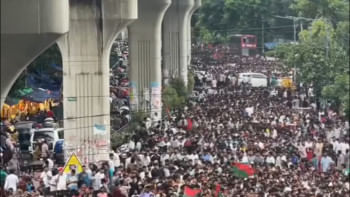Migration augments development

Are poverty and persecution the only reasons why we have seen so many people desperately trying to leave the country on boats?
Migration to Malaysia through maritime route is interlinked with the protracted Rohingya refugee issue. In 2012, when the government of Bangladesh decided not to allow the persecuted Rohingyas to enter the country, some of them took dangerous voyage to Malaysia through sea routes. The Malaysian government treated them with a degree of compassion. It encouraged others to follow suit. Bangladeshi human smugglers and Thai fishing trawlers, and later sea pirates, joined hands to expand this illegal business rapidly. By 2012, some Bangladeshis also started to take this risky journey. Most of those who ventured into this, originated from areas affected by natural disasters and climate change. In the absence of formal migration services, they became easy targets of human traffickers and smugglers. Reduced scope of formal migration also created space for irregular migration. In 2007 and 2008, almost 900,000 Bangladeshis were migrating to the Middle East and Southeast Asian countries each year. The figure came down to half in the past few years. Over the years, we have lost labour markets of Kuwait, Saudi Arabia and the UAE.
What kind of a fate awaits them after they reach the countries of destination?
If you go to Malaysia, you will see many Bangladeshis walking on the streets. Some of them went through irregular channels while others went with tourist or student visas and stayed back. They do not have work permits. They survive by doing odd jobs. They hardly have any freedom to move, the police harass them and if they are lucky to get jobs, employers can get away with paying them low wages. And some end up in detention centres.
What has been done to prevent people from falling victim to smugglers?
Until the discovery of the mass graves, the government did not take the issue seriously. Occasionally few boats got apprehended, but cases against the perpetrators were not filed under proper law and they came out of jail within a few days. The Overseas Employment and Migration Act 2013 has provision for 10 years' imprisonment and financial penalty up to Tk 10 lakh against the human smugglers. In order to ensure prosecution under this law, RMMRU filed a writ petition. Since then, some cases were filed under this law. Government and NGOs are now conducting awareness campaigns in certain parts of the country. But that's not enough. The perpetrators will have to be punished.
For the time being, the Bay of Bengal route is inactive, but it may start again once the rainy season is over. Moreover, irregular migration is still taking place by air. There is an increase in the number of people going to Libya via Sudan in an attempt to reach Italy. Their ultimate goal is to go to wealthier countries in Europe. You can hardly blame them for wanting a better life when opportunities at home are few.
How has the G2G programme to send workers to Malaysia fared so far?
Only 7,500 workers went to Malaysia under this programme in four years. Within a year of commencement of the programme, we realised that it would not work. Although our government tried to fix the problem on the supply side, very little was done at the demand side. The Malaysian employers did not recruit workers from online database as they were supposed to. Now a G2G Plus agreement is under discussion under which the Malaysian government is planning to take 1.5 million workers from Bangladesh over the next three years. There are reports that a powerful lobby is trying to thwart the process and monopolise this business by forming syndicates. In order to make G2G Plus a success, the government should be vigilant against such syndication and create a level playing field for all licensed recruiting agencies. It is essential for reducing the cost of migration and ensuring accountability of the recruiting agents.
In your opinion, what needs to be done to regain the lost labour market overseas?
The nation should make major investments in human resource development. The National Skills Policy will have to be implemented. In Nepal, I saw that they have developed training centres that are linked with the job market. Nepal used to send 50 to 60 thousand workers abroad annually. Now they send about 500,000. Most of these Nepalese are going through formal channels. There can be PPP (public-private partnership) programmes to establish training centres in Bangladesh. There has to be coordination among concerned ministries and agencies of the government. A new minister has taken over responsibility of the Ministry of Expatriates' Welfare and Overseas Employment. He should make fresh attempts to pursue bilateral agreements with our traditional labour receiving countries by acting on concerns of the latter.
How can we engage more expat Bangladeshis in the development of the country?
When the Ministry of Expatriates' Welfare and Overseas Employment was established, among others, it had two goals: to help migrant workers and to look after the interests of the diaspora. However, it is yet to come up with concrete programmes to tap the diaspora resources for the development of Bangladesh. India has declared January 9 as the Pravasi Bharatiya Divas coinciding with the day of Mr. Gandhi's return home from South Africa. In 2013, the country received 60 billion USD as remittances; on top of that 31 billion USD came as investment by the non-resident Indians. In Bangladesh only private universities has had success in attracting highly educated and talented expatriate Bangladeshis. Business links are yet to be established in a significant way.
What are the international organisations doing to monitor and regulate labour migration?
In 2004, the UN recognised that migrant workers are the most vulnerable workforce in the world. Kofi Annan, the then Secretary General, suggested that a UN body be formed to look after the interests of migrant workers. But that did not materialise. As a compromise, the Global Forum on Migration and Development (GFMD) was formed. The forum is playing a positive role in highlighting the contribution of migrants both in the receiving and sending countries. Among the western states, Switzerland stands out in promoting migration in the global development agenda. After discovering Aylan's body on the Turkish shore, we have seen a global outpouring of compassion for the refugees and other types of migrants. This is the time to start demanding a UN body on migration. In the Sustainable Development Goals 2030, migration has been mentioned in several indicators. The governments need to integrate migration into their long-term development goals.
[Dr Tasneem Siddiqui is one of the key members of committees which drafted the National Overseas Employment Policy 2006 of Bangladesh and the Emigration and Overseas Employment Act 2013.]
-The interview was taken by Amitava Kar.

 For all latest news, follow The Daily Star's Google News channel.
For all latest news, follow The Daily Star's Google News channel. 



Comments